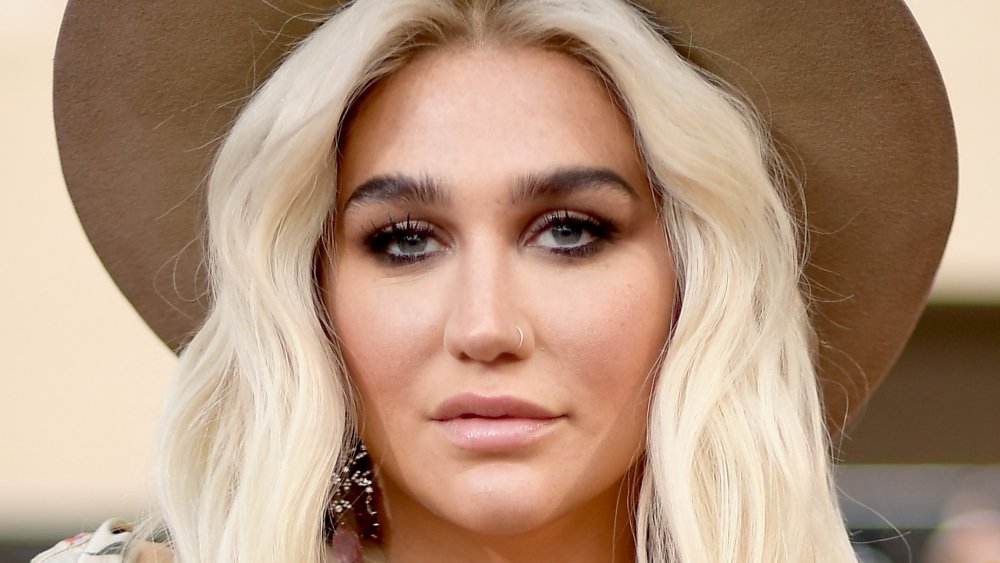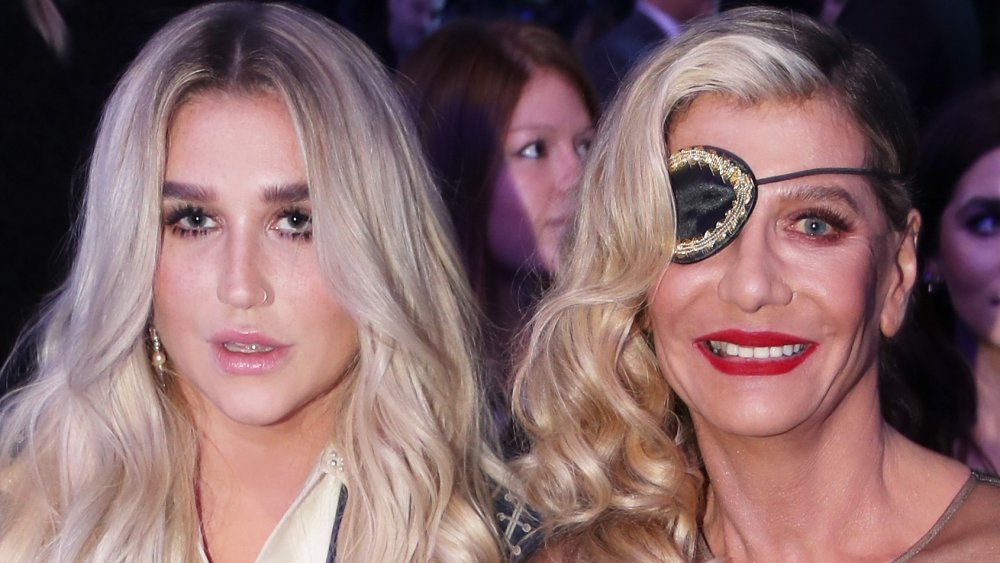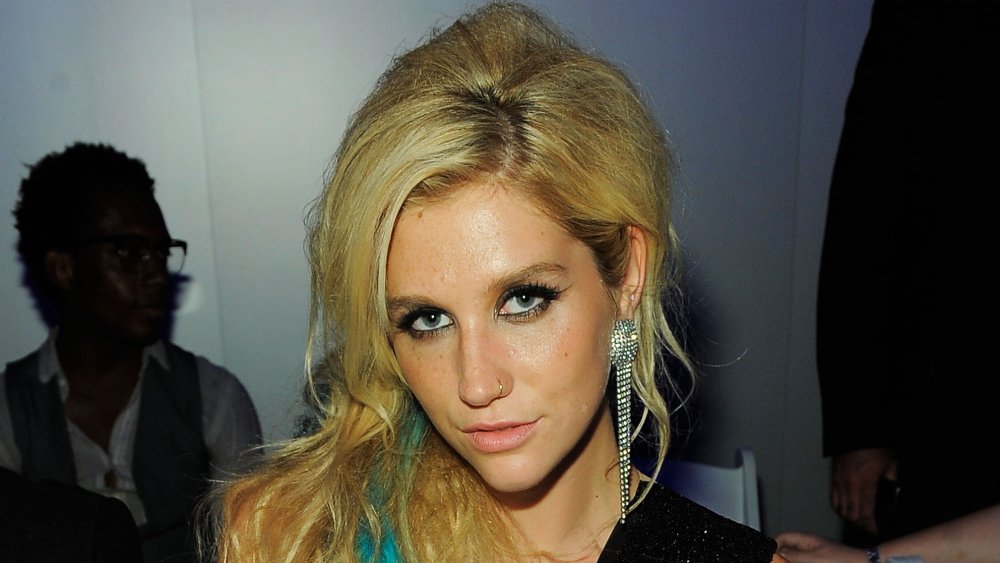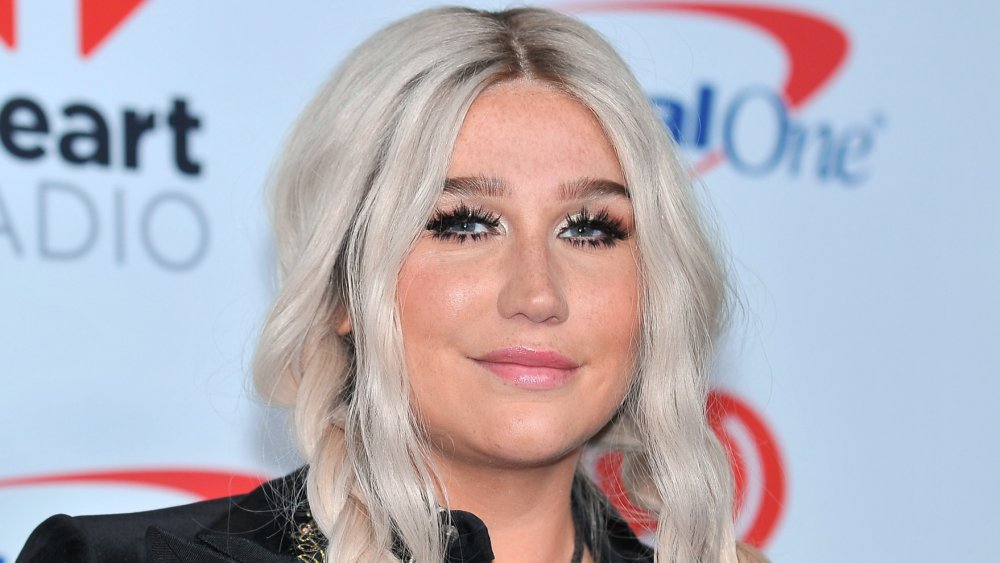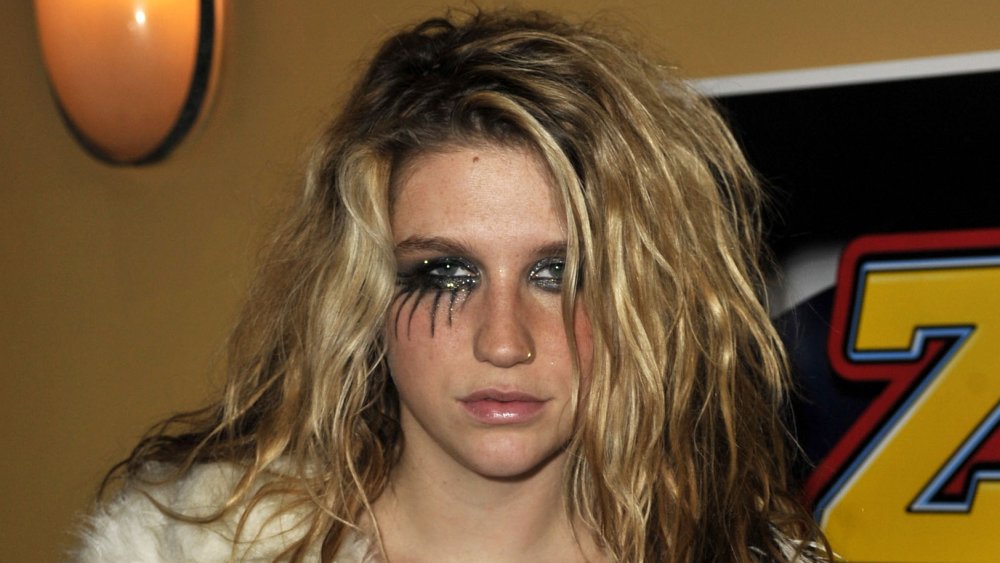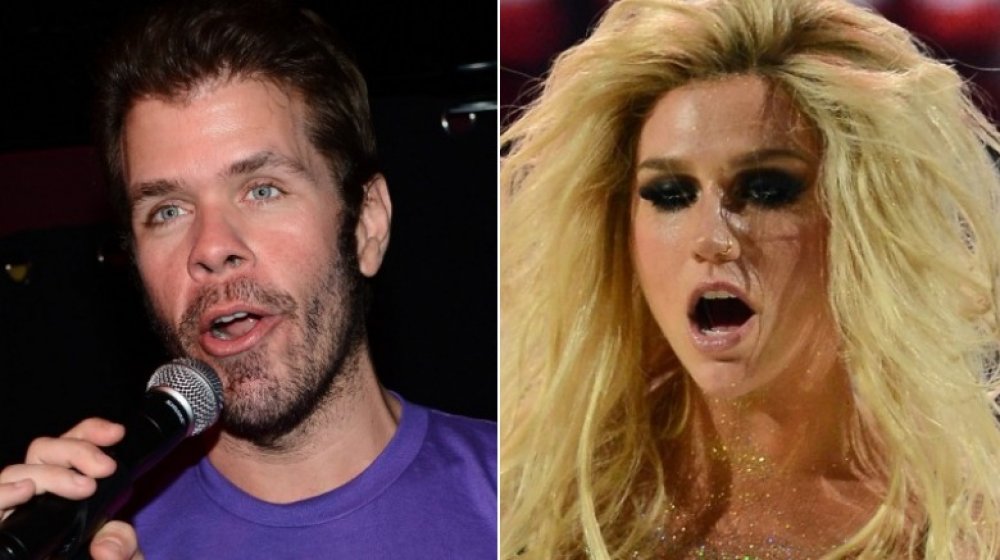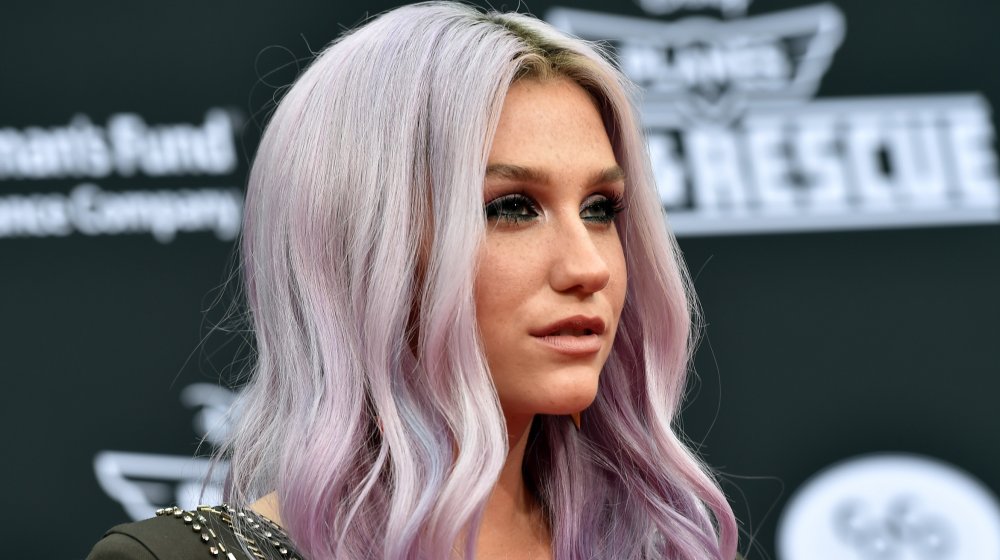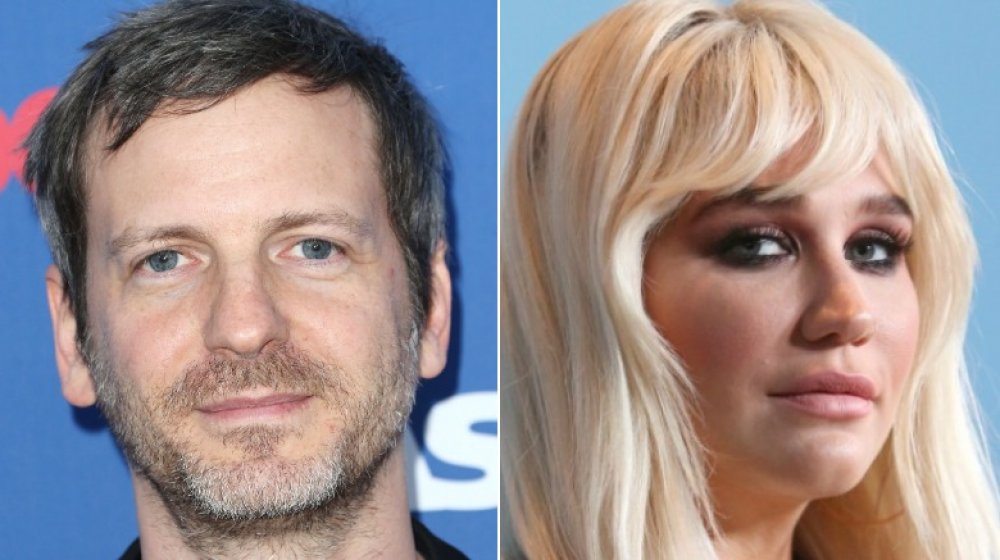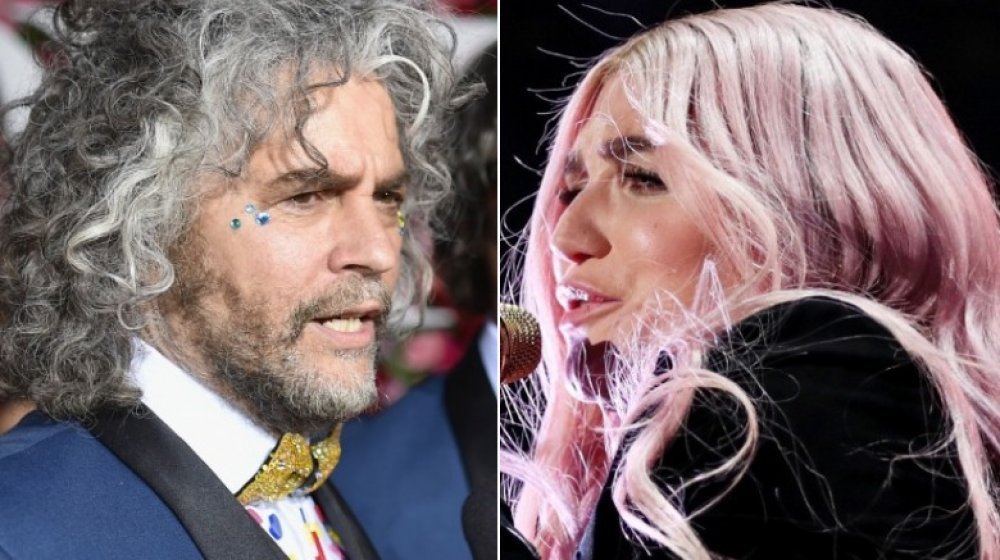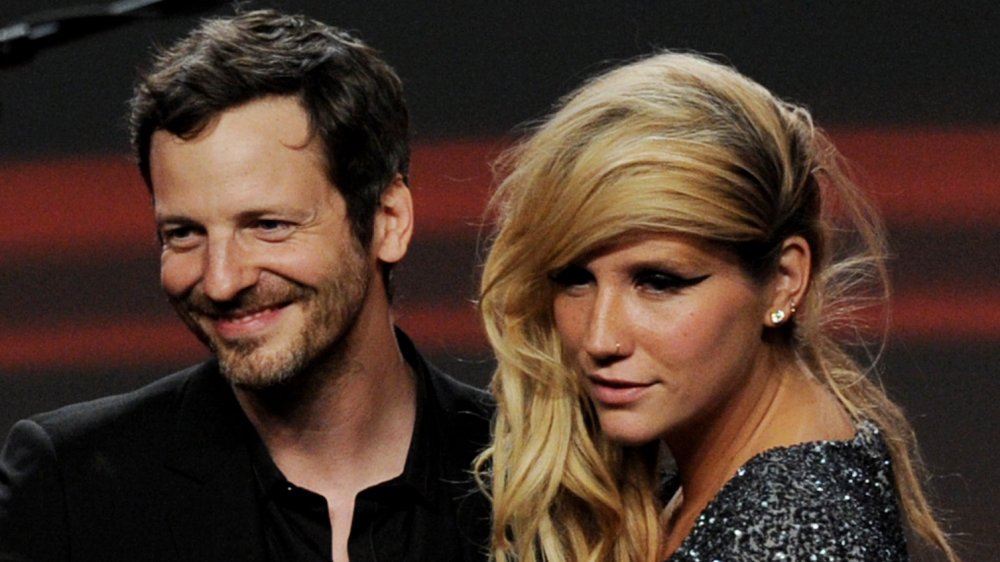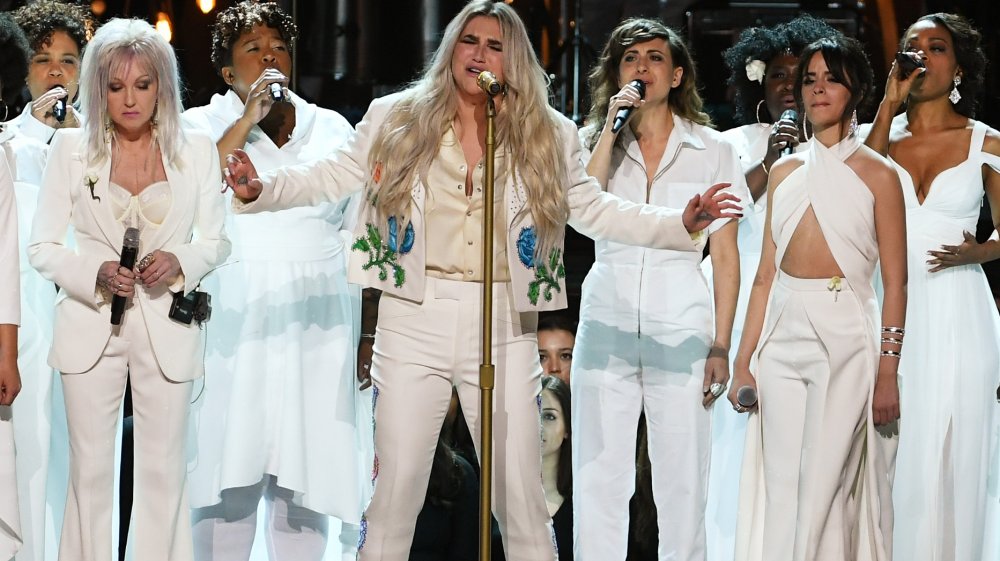Inside Kesha's Tragic Life
Kesha burst onto the music scene in 2009 with "Right Round," a collaboration with Flo Rida, followed by the smash "Tik Tok," depicting her life as a party girl who swaps out Listerine for Jack Daniels. Her cheeky sense of humor, combined with infectious beats, gave the world the impression that the pop star had quite a devil-may-care attitude.
But it turns out, Kesha (full name Kesha Rose Sebert) cares a lot — and she's unfortunately been through some truly traumatic events in her life, including at birth. In a somewhat sad but also bizarre story, the "Animal" hitmaker once claimed she was born with a trademark feature she no longer has. "I had a tail when I was born," she told Heat magazine (via HuffPost) in 2013. "It was a tiny tail, about a quarter of an inch, then they chopped it off and stole my tail. That was when I was little. I'm really sad about that story."
That said, it's the least sad story in the canon of things you might not know about Kesha's life. Thankfully, the artist formerly known as "Ke-Dollar-Sign-Ha" has come through these serious struggles all the better for it, with a beautiful transformation into the musician we all know and love today. Get to know the storms behind the Rainbow singer-songwriter with a look inside Kesha's tragic life.
Kesha doesn't know who her father is
In a 2009 interview with The Guardian, Kesha revealed that she has pretty much no idea who her biological father is. However, she didn't necessarily feel like she missed out on anything by not having a paternal figure in her life, saying of her mother, songwriter Pebe Sebert, "She taught me that you don't need anybody else to validate anything. She wanted a child, she had me, she didn't want a man to tell her when and what to do." Kesha added, "I think that's bada**. She's a strong woman, a total hippie."
While Kesha did recall once meeting a man whom Sebert said was "probably" her father, she admitted she felt little to no connection to him and doubted his paternity as a result. "He said I could stay with him and have this father/daughter thing. Then I met him at the airport and I instantly knew, 'There's no way you're my dad,'" she told the publication, adding, "I mean, you just know if someone is your contributor to your being of life." Still, she moved in with him in Los Angeles because, as the singer-songwriter explained, she didn't know anyone else there. However, her non-father apparently spent most of his time playing video games.
Kesha later told Rolling Stone that her January 2020 album, High Road, includes a song called "Father Daughter Dance," which examines what her life may have been like with a dad.
Another man claimed to be her father, but she denied it
In 2011, a man named Bob Chamberlain came forward to Star magazine (via Seattle PI), claiming that he was Kesha's father — and that she knew it and he helped raise her — leaving him heartbroken and baffled as to her claims of not knowing her dad. Chamberlain, an engineer, reportedly showed the tabloid letters from Kesha allegedly addressed as "Dear Dad" from her adolescence.
"I was in her life from the time she was born until she was 19 years old," he claimed. "The contact ended, and I have no idea why." Chamberlain speculated that perhaps Kesha's team thought it was best to further market her as a misfit and "perpetuate those myths."
While Kesha's reps didn't comment on Star magazine's story, she didn't take the claims seriously. "Rehearsing for tour, doing interviews, still don't know who my dad is," she simply tweeted at the time. "Yep, bizness as usual today."
Kesha grew up poor
Being raised by her songwriter single mom, Pebe Sebert, with two brothers wasn't always easy for Kesha. In 2009, it was revealed in an interview with The Guardian that Kesha grew up poor in Nashville, Tenn., explaining that her family relied on welfare and food stamps for a long time, during which Sebert was blunt about the difference between needs and wants. "One of my first memories was of my mother saying, 'If you want something at Target, you have to take it,'" Kesha recalled. "It was a kitty cat stuffed animal. I don't remember if I took it or not. I was about three or four at the time but I was happy."
Kesha sings about "pissing in the Dom Perignon" in her song "Party at a Rich Dude's House" from Animal, which The Guardian interpreted as a statement on wealth inequality in late 2019. While the pop star admitted she wasn't explicitly addressing the perils of capitalism, she did relate to the idea of "growing up without extravagance," and noted how her mom "still found a way to make life very joyful." Kesha added, "I never felt like I went without."
She made no money from her first hit
Kesha's poverty actually continued into the early days of her pop stardom. Shocking as it may seem, she didn't make a dime from her feature on Flo Rida's "Right Round," which inspired her to temporarily add the dollar sign to her stage name. According to Vulture, Kesha initially wasn't credited on the American release of the song, which Dr. Luke co-wrote and produced, and also claimed she was never paid for her vocals on it.
"The dollar sign, to be honest, was me taking the piss out of being broke," she told The Guardian. With her newfound stardom, Kesha worked a regular job as a waitress and as a songwriter for other artists. "I would hear my voice everywhere — I'd walk into a movie and it would be playing," she said. "I'd walk into Walgreens, the grocery store, and it was playing, at a time when I didn't even have enough money to buy my groceries in, like, the dollar store." Basically, the musician was pretty broke at the time, and added that she even heard the track at a bar with friends: "One of my favorite memories in my entire life is sitting in that crappy bar with my friends eating free tacos. There is no correlation between happiness and amounts of money."
Perez Hilton posted explicit leaked photos of Kesha
Early on in her career, Kesha was in a relationship with a man named Harold, who was the love of her life at the time. But in December 2012, two years after Perez Hilton swore to stop cyber-bullying celebs (and unfortunately before revenge porn laws were made mainstream following the celebrity nude photo hackings of 2014), the blogger posted intimate leaked photos of Kesha, which she said destroyed her relationship.
Kesha chronicled Hilton's actions in her MTV documentary series, Kesha: My Crazy Beautiful Life, which showed Kesha learning of leak just hours before she was due to perform on The X Factor. She sobbed on the phone to her mom and said in a voice-over that she thought the days of Hilton "torturing" her were behind her — but she was wrong. The singer later she forced herself to rally, even though she wanted to break down, saying in a voice-over, "This picture leak is awful, but I can't let it hurt my performance. There will always be haters, but it's how you respond that matters ... I know I have to be strong and not let it get to me, otherwise he wins."
In another episode, Kesha lamented (via HuffPost), "[Hilton] single-handedly ruined the only relationship that's ever meant anything to me. My family doesn't have to deal with this. He stands for everything I hate. Everything I'm against."
She went to rehab for an eating disorder
In January 2014, Kesha checked into a rehabilitation center after struggling with an eating disorder, where she stayed for three months. Explaining that her condition was triggered by pressures from the music industry and media, she told Rolling Stone, "I was slowly, slowly starving myself. The worse I got and the sicker I got, the better a lot of people around me were saying that I looked. They would just be like, 'Oh my gosh, keep doing whatever you're doing! You look so beautiful, so stunning.'" Kesha finally realized she needed help when she felt "mounting anxiety" at a dinner party about whether the other attendees would realize she wasn't eating.
As for what rehab was really like for this celeb, a nutritionist and therapists taught her to love herself again while receiving treatment at Timberline Knolls outside of Chicago, but it wasn't easy. "I just remember crying into a carbohydrate," Kesha said, "Being like, 'I can't eat it. It's going to make me fat, and if I'm fat, I can't be a singer because pop stars can't eat food — they can't be fat.'"
The singer later revealed at a SXSW talk that her doctors "were surprised [she] hadn't had a stroke — because [she] hadn't consumed enough" for so long and "almost died." Following her recovery, Kesha thankfully not only had a healthier relationship with food, but also with social media and alcohol consumption.
Kesha's harrowing legal battle with Dr. Luke
Kesha sued her longtime producer, Dr. Luke, in October 2014, alleging that he drugged and sexually assaulted her on at least one occasion, according to TMZ. In addition to fearing physical violence from him, she also claimed he was verbally and emotionally abusive during the near-decade they'd worked together, including allegedly bodyshaming her, which further triggered her eating disorder. Dr. Luke (real name Lukasz Sebastian Gottwald) vehemently denied the allegations and countersued Kesha for defamation and breach of contract, accusing her of trying to extort him to get a new record deal. The two have gone back and forth in court in both California and New York ever since.
After adding Sony to her lawsuit in June 2015, alleging that the label turned a blind eye to Dr. Luke's reported abuse, Kesha was denied her request to leave Sony the following February. She appealed the decision a month later, and claimed in April 2016 that Dr. Luke allegedly offered her a settlement and to release her from his label if she recanted her rape allegation — which she refused to do. However, Kesha later dropped her sexual abuse lawsuit against him in order to focus on her music.
In September 2019, Kesha was denied an appeal in her New York countersuit to exit her contract with Dr. Luke. Meanwhile, Dr. Luke's defamation suit remained ongoing.
She had to scrap an entire album with The Flaming Lips
Kesha developed a friendship with Flaming Lips frontman Wayne Coyne in 2012 when they worked on a collaboration album called The Flaming Lips and Heady Fwends. That inspired the duo to conceptualize an entire album together called Lip$ha. Coyne explained in a Reddit AMA, "It's really just a matter of what we can call it contractually. I just make music with her because I think she's cool. The rest we'll have to let [the record label] sort out."
Unfortunately, their labels never sorted things out. Coyne tweeted in November 2013, "As of now ... sadly there will be no Lip$ha ... I can't say why ... It is sad." He went on to collaborate with Miley Cyrus, and explained to Radio.com in October 2014 that he believed Dr. Luke may have been behind why he and Kesha couldn't work together. "I don't know Dr. Luke at all, but when [Kesha and I] speak, I know there's some anxiety about their relationship," he said (via NME), hinting that Kesha isn't the only artist who's had drama with Dr. Luke. "I think she would like to have the freedom to do more things in that spirit." Coyne added, "Miley is a lot more of her own entity ... the king of her own destiny. And I think Kesha will get to that eventually. She doesn't have that sort of power now, but I think she will eventually."
Kesha lacked creative control for a very long time
Throughout Kesha's lawsuit against Dr. Luke, her career remained in limbo as she tried to extricate herself from her recording contract. She wasn't able to release new music for much of it, alleging that Dr. Luke wouldn't allow it. He denied the claims, and in April 2016, Kesha released a collaboration with Zedd, "True Colors," with Dr. Luke's permission. Kesha was slated to perform at the Billboard Music Awards the following month, until Dr. Luke's team temporarily revoked permission. They later granted it, saying in a statement she was initially prohibited from taking the stage in case she used the platform to discuss their ongoing litigation.
It wasn't the first time Dr. Luke reportedly tried to exert creative control over Kesha's work. She told The Guardian in 2019 that he instructed her to embody the persona of the wild, fun party girl and to release auto-tuned pop songs for Warrior – including "Die Young," which faced backlash in light of the Sandy Hook school shooting.
"What's been put out as singles have just perpetuated a particular image that may or may not be entirely accurate," Kesha previously told Rolling Stone. "I'd like to show the world other sides of my personality. I don't want to just continue putting out the same song and becoming a parody myself. I have so much more to offer than that and I can't wait till the world really gets to hear that on the radio."
Kesha just missed the #MeToo movement — but is moving on
2017 saw the release of Kesha's first solo single in years, "Praying," and her empowering album, Rainbow – on which she had creative control. Months after the emotional single was released, the #MeToo movement was underway, leading a slew of female artists and sexual assault survivors to join Kesha onstage at the 2018 Grammys for a moving performance of the track.
Of the #MeToo movement in general, Kesha told Rolling Stone in October 2019, "Obviously I'm heartbroken that any kind of sexual abuse happens to any human being in the world. It shouldn't have to be something that is a movement, and that makes me really sad. But I commend any person who has stood up and told their truth, because it's really difficult." While making it clear that she couldn't speak much about her ongoing litigation with Dr. Luke, Kesha has found plenty of support within the industry, with stars like Adele, Lady Gaga, Kelly Clarkson, Ariana Grande, and Taylor Swift (who even donated a hefty sum to her legal fees).
Kesha's January 2020 album, High Road, would mark her return to pop form. "When I wrote Rainbow, I was in a very different headspace," she said in a trailer for the record. "I had to address some very serious things. But now, on my new record, I revisit my roots of pure and utter debaucherous joy. Kesha got her balls back and they're bigger than ever."

